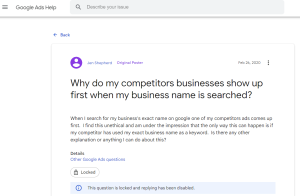Navigating Competitor Use of Your Brand Name in Google Ads: A Comprehensive Guide
Experiencing a competitor’s advertisement when someone searches for your brand can be disconcerting. But is it legal for competitors to use your brand name in Google Ads? This guide delves into the legality of such practices, explains the nuances of trademark use in ads, and offers strategic advice on how to handle and leverage this competitive landscape.
Understanding the Use of Brand Names in Google Ads
When your competitor advertises their company for your brand name in their Google Ads, it can feel like a direct challenge. But under current advertising policies, this practice is not only completely legal but quite common as you can see here on Google Help. Of course with several nuances:
1. Legality of Using Competitor Brand Names
Google’s policies from the late 2000’s allow advertisers to bid on competitors’ branded keywords. This means that if your brand name is not trademarked, other companies can legally use it in their ad campaigns. However, the usage must not be deceptive, such as implying an endorsement or affiliation that doesn’t exist.
2. Trademark Protection
If your brand name is trademarked, you have stronger protections. Trademarked terms are owned by the registrant, and Google typically prohibits other advertisers from using such terms in their ad copy. Exceptions exist for authorized resellers or informational ads (e.g., a retailer listing that they sell a particular branded item).
Responding to Competitors Using Your Brand Name
While competitors may legally use your brand name under certain conditions, there are proactive steps you can take:
1. Bidding on Your Own Brand Name
Always bid on your own brand name. This strategy helps to secure the top ad placements in search results, reducing the visibility of competitors’ ads.
2. Establishing Non-Bidding Agreements
Consider reaching out to competitors for an agreement not to bid on each other’s branded keywords. While not always feasible, such arrangements can help manage advertising costs and reduce conflicts.
3. Legal Recourse for Trademark Infringement
If a competitor uses your trademarked name in a way that violates Google’s policies, you can file a complaint with Google. For severe cases, such as a competitor using your trademark to mislead consumers, legal actions like cease and desist letters may be appropriate.
Strategies for Bidding on Competitor Brand Names
Deciding whether and how to bid on a competitor’s brand name involves careful strategic planning:
1. Selecting Competitors to Target
Focus on competitors that share a similar target audience and offer comparable products or services. Avoid targeting vastly larger or unrelated brands as this can be inefficient and ineffective.
2. Crafting Distinctive Ad Copy
Your ad copy should clearly differentiate your offerings from those of the competitor. Highlight your unique selling propositions, such as better pricing, superior service, or exclusive features.
3. Designing Targeted Landing Pages
Create landing pages that are specifically designed for campaigns involving competitor keywords. These pages should compare your products or services against those of the competitor, emphasizing why your offerings are better.
Leveraging Competitor Tactics for Your Benefit
Learning from competitors can also offer strategic advantages:
1. Analyze and Adapt Competitor Strategies
Study how competitors use your brand name in their campaigns. Adapt their successful tactics and improve upon them to enhance your own ad performance.
2. Utilize Google’s Ad Features Fully
Make full use of Google’s ad extensions and other features to maximize the impact and reach of your ads. These features can significantly increase your visibility and attract more clicks.
3. Consider Ethical Implications
While it’s possible to bid on competitors’ brand names, consider the ethical implications and potential customer perception. Focus on promoting your brand positively rather than diminishing others.
Conclusion
While competitors can legally bid on your brand name in Google Ads, understanding and navigating the rules can protect and even enhance your brand’s market position. Partnering with a skilled digital marketing agency like Top Marketing Agency can provide the expertise needed to manage these issues effectively, ensuring that your advertising efforts are both strategic and compliant.
























My business has worked with Top Marketing Agency for the past few years and they have been amazing. Their agency is like an extension of our company, they know what we need and they are driven to help us succeed!